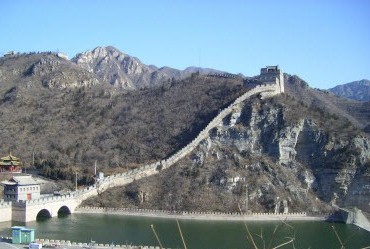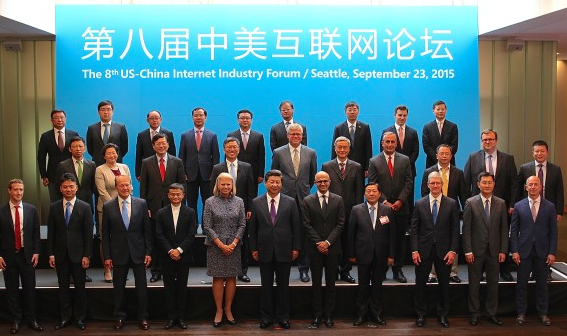Cisco Doubles Down in China

Cisco Systems continues to expand its considerable presence in China despite growing friction between U.S. high-tech companies and the government of Chinese President Xi Jinping.
On the eve of President Xi's visit to the U.S., Cisco CEO Chuck Robbins provided more details about a joint venture with Chinese cloud computing and datacenter company Inspur Group. The Chinese server maker is the primary vendor behind the Tianhe-2, the world's fastest supercomputer.
Cisco signed a "strategic cooperation framework agreement" during a U.S. tech industry meeting with President Xi in Seattle, Robbins announced in a blog post this week.

Cisco Systems chairman John Chambers (front row, third from left) was among the U.S. high-tech officials to meet this week with Chinese President Xi Jinping.
Robbins said the deal with Inspur includes a joint venture in China to develop and sell networking and other IT technologies along with new services in areas like IT infrastructure, cloud, datacenters, smart cities and big data. The Cisco CEO said the partners would initially invest $100 million as part of a previously announced $10 billion China initiative.
"China represents approximately 3 percent of our business, and being the world’s second largest economy, we see the potential to increase this considerably over time," Robbins asserted. That remains to be seen given the recent collapse of the Chinese stock market and a pronounced slowdown in Chinese spending in other strategic sectors. It is also unclear to what extent the slowdown in other Chinese industries will affect its nascent high-tech sector, observers note.
Cisco appears to be doubling down on its China bet as other U.S. tech firms grow increasingly circumspect in response to the government's market access demands in areas like Internet security and intellectual property.
The networking giant has a checkered past in the Chinese market, including reports that it and other U.S. networking and IT vendors helped deploy what became known as the "Great Firewall of China." According to media reports and the Council on Foreign Relations, Cisco and Juniper Networks were instrumental in supplying equipment for Chinese network upgrades that "significantly increased China's ability to monitor Internet usage," the think tank asserted. The upgrade reportedly included thousands of Cisco routers.
Nevertheless, Robbins said the Inspur joint venture could help sustain what he described as "the recent momentum that we’ve seen in our business in China." He added that the company's quarterly results in China " were more encouraging than any quarter over the past two years."
Cisco announced a $10 billion investment in China in June. This week's joint venture deal includes reselling networking equipment and joint development of networking hardware and software. Inspur would reportedly maintain a 51 percent stake in the joint venture, a common arrangement for U.S. companies seeking access to the Chinese market.
IBM agreed to a similar partnership with Inspur last year after the Chinese server maker launched a marketing campaign to lure away customers. Inspur, the first Chinese company to make high-end servers, agreed to use IBM database and Websphere software along with Power8 chips in its new server designs.
Related
George Leopold has written about science and technology for more than 30 years, focusing on electronics and aerospace technology. He previously served as executive editor of Electronic Engineering Times. Leopold is the author of "Calculated Risk: The Supersonic Life and Times of Gus Grissom" (Purdue University Press, 2016).











